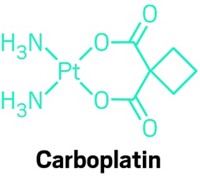Advertisement
Grab your lab coat. Let's get started
Welcome!
Welcome!
Create an account below to get 6 C&EN articles per month, receive newsletters and more - all free.
It seems this is your first time logging in online. Please enter the following information to continue.
As an ACS member you automatically get access to this site. All we need is few more details to create your reading experience.
Not you? Sign in with a different account.
Not you? Sign in with a different account.
ERROR 1
ERROR 1
ERROR 2
ERROR 2
ERROR 2
ERROR 2
ERROR 2
Password and Confirm password must match.
If you have an ACS member number, please enter it here so we can link this account to your membership. (optional)
ERROR 2
ACS values your privacy. By submitting your information, you are gaining access to C&EN and subscribing to our weekly newsletter. We use the information you provide to make your reading experience better, and we will never sell your data to third party members.
Biological Chemistry
Blocking Calcium-Sensing Receptors Could Treat Asthma
Medicinal Chemistry: Receptor antagonists relieve airway constriction and reduce inflammation in mice
by Michael Torrice
April 27, 2015
| A version of this story appeared in
Volume 93, Issue 17
For about 10 to 15% of patients with asthma, inhaled corticosteroids, which are standard asthma medications, don’t have much effect in decreasing symptoms such as wheezing and shortness of breath. Now, researchers report that calcium-sensing receptors (CaSRs) could be novel targets for asthma drugs. The receptors are found in many tissue types and bind positively charged ions and biomolecules. Daniela Riccardi of Cardiff University, in Wales, and her colleagues decided to look at CaSR because levels of positively charged proteins, such as eosinophil cationic protein, are elevated in the lung mucus and blood of asthmatic patients. The team found higher expression levels of CaSRs in airway smooth muscle tissue samples from asthmatic patients compared with levels in healthy people. In two types of mice with asthmalike symptoms, inhaled CaSRs antagonists (one shown) reduced airway constriction and hyperactivity, and also decreased the number of immune cells in lung fluid, a sign of inflammation (Sci. Transl. Med. 2015, DOI: 10.1126/scitranslmed.aaa0282). Although the results are promising, data from mouse models of asthma are not always great predictors of success in patients, says Elliot Israel, who studies asthma at Brigham & Women’s Hospital, in Boston.





Join the conversation
Contact the reporter
Submit a Letter to the Editor for publication
Engage with us on Twitter